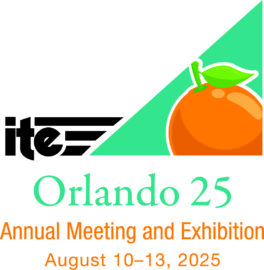2020 Virtual Meeting
The program for the 2020 National Rural ITS Conference was integrated into the Joint ITE International and Southern District Annual Meeting and Exhibit held August 4-18, 2020 in a virtual setting. This year’s conference covered emerging technologies and trends from across the transportation industry including a focus on transportation equity considerations and exploration of the potential of big data and data analytics. This conference offered insights to help understand the impacts of COVID-19 and how to respond to these changes.
The conference provided participants resources focusing on Intelligent Transportation Systems (ITS) implementation in local communities and the opportunity to hear new and thoughtful perspectives from a wide variety of ITS topics. The conference guidebook provides an overall view of the conference speakers and topics. Individual session recordings from the conference are available through the links below:
Technical Sessions
Wednesday, August 5, 11:00 a.m. – 12:30 p.m.
Best Practices in Special Events and Extreme Weather Event Management
Moderator: Anthony Castellone, P.E., PTOE, Transportation Division Manager, Pennoni Associates
The safety and reliability of the transportation system is affected by a variety of impacts from weather, tourism and special events. Many of these issues affect rural and small communities where the roadway networks are limited or may be compromised, and a mix of ITS applications can improve conditions for the traveling public.
- Hans Larsen, Director of Public Works, City of Fremont, CA
- Real-Time Traffic Operations Solutions for Inclement Weather, John Abraham, Director, Macomb County Department of Roads – Traffic Operations Center
- Matt Glasser, P.E., Assistant State Traffic Engineer, Georgia Department of Transportation
Wednesday, August 5, 1:30–3:00 p.m.
Enhancing Safety of First Responders Through Technology
Moderator: Pat Noyes, Principal, Pat Noyes & Associates
This session focuses on the current work of the Transportation Safety Advancement Group (TSAG) in the areas of real time information sharing and interoperability, the linkage between connected and automated vehicles and emergency response as well as the use of cloud-based virtual coordination to manage incidents.
- New Technology Requirements for Emergency Response in the Connected Vehicle and Smart City Future, Jon Ringler, Vice President, Econolite
- Seattle Area Partnership Aims to Deploy a Cloud-based Virtual Coordination Center to Better Manage Congestion Caused by Major Incidents, Travis Phelps, Near-Term Mobility Manager, Washington State Department of Transportation
- 2020 Transportation Safety Advancement Group (TSAG) Projects Update, Pat Noyes, Principal, Pat Noyes & Associates
Wednesday, August 5, 4:00–5:30 p.m.
Innovative Concepts for Managing Trips in Rural and Small Communities
Moderator: Valerie Briggs, Director, Office of Transportation Management, FHWA
This session covers a variety of concepts to improve trip making in rural communities including planning concepts, transit and traffic system design in low density areas, as well as rail grade crossing gate condition information when alternate routes are miles away.
- Designing for Traffic and Transit in Low Density Urban Areas, Arjan Van Andel, Lead MaaS, PTV America and Ramond Robinson, Head of Transportation, Anne Arundel County, MD
- Transportation’s Role in Rural Communities: Valuing the Past, Planning for the Future, Steven Gayle, PTP, Director, RSG, Inc
- Adapting for Tourism: Real-Time Traffic Optimization for Commercial Development, Marissa Tarallo, P.E., PTOE, Senior Technical Director – Traffic and Transportation, AKRF, Inc.
- Initiating the Systems Engineering Process for Rural Connected Vehicle Corridors, Barbara Staples, CSEP, PMP, Principal, Noblis, Inc.
Thursday, August 6, 11:00 a.m. –12:30 p.m.
Creative Management of Work Zones
Moderator: Scott Knebel, Vice President, Crawford, Murphy & Tilly
Work zones are a necessary part of roadway maintenance and construction. However, simply setting up a work zone isn’t enough – a plan to actively manage operations and safety in the work zone is also needed. This session covers a range of topics to stimulate out of the box thinking on planning for work zones.
- You’re Closing the Highway!!!?? Trans Canada Highway – Kicking Horse Canyon, Mariya Otten-Andrew, P.Eng, PTOE, MIEAust, CPEng, Manager – Transportation Planning Alberta, WSP Canada
- Automated Speed Enforcement in Pennsylvania Work Zones, Mahmood Shehata, P.E., Manager – Transportation (Traffic and ITS), RK&K and Daniel Farley, P.E., Chief, TSMO Operations and Performance Section, Pennsylvania DOT
- NextGen Work Zone Database/iCone Pilot Project – From Planning the Work to Working the Plan with Real-time Communications, Anton (Tony) Leingang, State Incident Management and Operations Administrator, Washington State Dept of Transportation
Thursday, August 6, 4:00–5:30 p.m.
Informing the Traveler and Their Vehicle
Moderator: Dale Picha, P.E., PTOE, Traffic Operations Manager, Texas Department of Transportation
Drivers need information on the condition of the roadway ahead of them and a variety of systems and communication methods are coming into use. This session provides information on a number of these topics.
- Automating Snow Detection on Roads Using Existing Road Cams, Shane Zumpf, Application Development Lead, Trihydro
- The One-Stop-Shop for Rural Traveler Information – Serving Real-Time Traveler Information Across the Western States, Douglas Galarus, Assistant Professor, Computer Science Department, Utah State University and Sean Campbell, P.E., Project Manager, California Department of Transportation
- Accurate, Timely, Reliable…A Look at the Current State of Traveler Information, Data Quality and Performance Objectives in Rural Areas Within California, Keith Koeppen, P.E., ITS Engineer, Califonia Department of Transportation and Sean Campbell, P.E., Project Manager, California Department of Transportation

